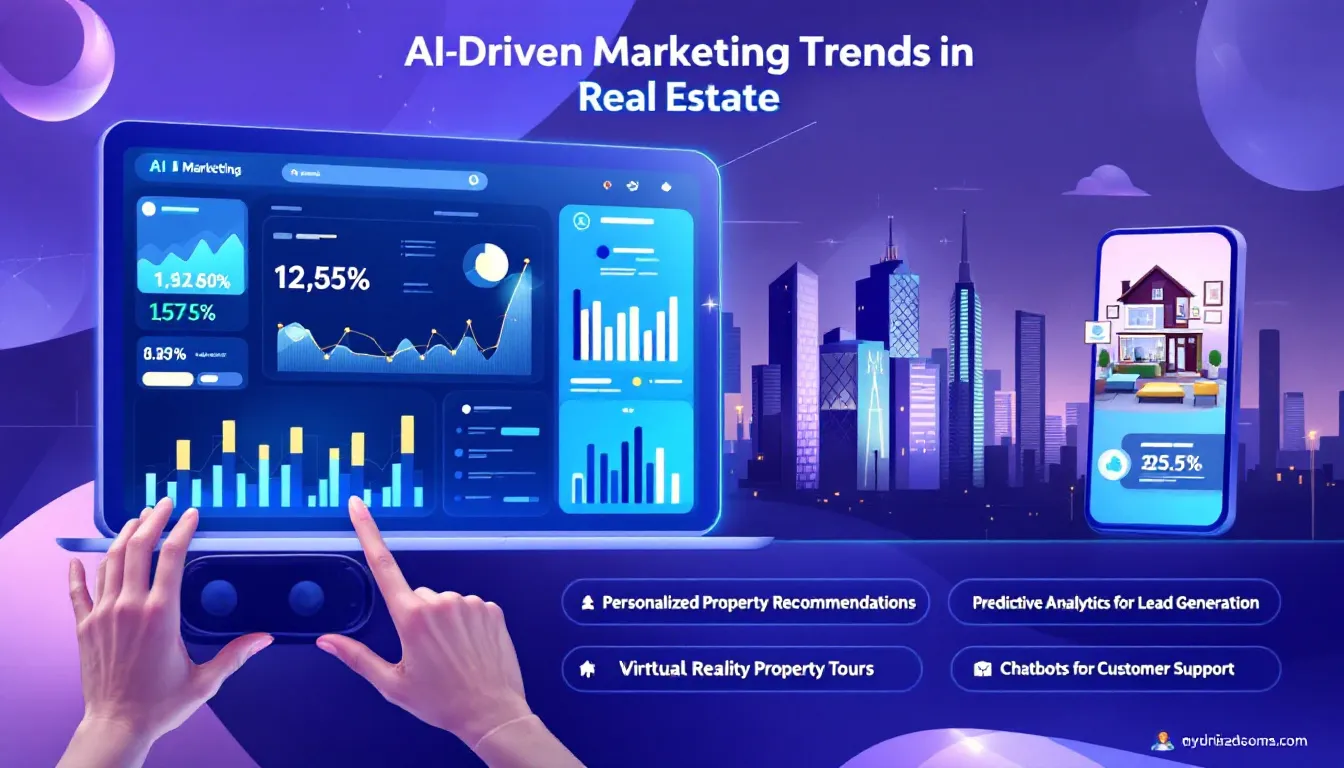
Introduction
The real estate industry is in the middle of a remarkable transformation, and one of the driving forces behind this change is AI digital marketing in real estate. From automating property ads to delivering highly personalized client experiences, artificial intelligence (AI) is reshaping how real estate agents, brokers, and property managers connect with their audiences through digital marketing strategies.
Of course, with new opportunities come new challenges. In this article, we’ll explore the biggest trends in AI-powered digital marketing for real estate, highlight the main benefits, and take an honest look at some of the potential pitfalls professionals should consider as they adopt these tools. A key aspect of these strategies is enhancing brand recognition through comprehensive digital marketing efforts, such as multilingual press releases and targeted social media campaigns. Achieving digital marketing success is a critical goal for real estate professionals navigating this competitive landscape.
Understanding the Real Estate Market
The real estate market is a dynamic and multifaceted industry that demands a keen understanding of digital marketing strategies to thrive. Real estate companies must stay abreast of the latest trends and technologies to attract potential clients and generate leads effectively. A well-crafted digital marketing strategy can help real estate businesses establish a strong online presence, drive website traffic, and ultimately boost sales and revenue.
Leveraging digital marketing tools such as social media platforms, search engines, and email marketing allows real estate agents to reach a broader audience and target specific demographics and interests. For instance, social media platforms like Facebook and Instagram can be used to showcase property listings and engage with potential buyers, while search engine optimization (SEO) ensures that your listings appear prominently in search results. Email marketing campaigns can nurture leads by providing valuable insights and updates on new listings, keeping your audience engaged and informed.
In essence, a strategic approach to digital marketing can position real estate businesses for success in an increasingly competitive market.
Key Trends in AI Digital Marketing in the Real Estate Industry

1. Hyper-Personalized Advertising
If you’ve ever noticed how certain ads seem to know exactly what you’re looking for, that’s hyper-personalization at work. AI tracks and analyzes user behavior—things like searches, visits to real estate websites, and even social media activity—to tailor ads that match individual preferences.
Instead of blasting the same property ad to everyone, AI helps ensure each potential buyer or renter sees listings that fit their unique criteria, whether that’s a specific neighborhood, budget, or type of home. This kind of micro-targeting gives real estate professionals a competitive edge by attracting highly interested buyers. Additionally, hyper-personalized advertising helps in identifying and engaging qualified prospects by using retargeted ads and segmenting audiences based on previous behaviors.
2. Automated Content Creation
Let’s be honest—writing polished real estate marketing content, blog posts, or social media captions takes time. AI is stepping in to lighten the load. With just a few property details, AI can now generate SEO-friendly, engaging copy within seconds, helping agents maintain a strong online presence across platforms like Google and Facebook.
This ensures consistency across channels and boosts the visibility of property listings on search engines and social media platforms—two of the most essential tools for any digital marketing plan today. Additionally, digital ads can be automated to maintain consistency across channels, leveraging platforms like Google Ads and Facebook Ads to enhance marketing effectiveness.
3. Predictive Lead Scoring
One of AI’s most exciting capabilities is its predictive power. By analyzing historical data, AI can predict which leads are most likely to convert or which property owners might soon be ready to sell. This allows real estate professionals to focus their efforts on attracting buyers who are truly ready to move forward. Predictive lead scoring helps attract buyers by identifying those who have shown interest in properties and are more likely to engage, thereby increasing the chances of successful transactions.
This kind of lead generation goes beyond guesswork—AI helps you allocate your marketing budget more effectively by targeting high-quality prospects.
4. Chatbots and Virtual Assistants
AI-powered chatbots and virtual assistants have become staples in real estate digital marketing. These tools handle everything from answering questions to scheduling virtual tours and even sending reminders—all around the clock.
For busy agents, this means no lead is left behind, even outside office hours. For potential clients, it means getting fast answers and service when they need it most, improving the overall customer journey.
5. AI-Enhanced Search and Matching
Searching for the perfect property can feel overwhelming, but AI makes it easier. Advanced algorithms now analyze a prospect’s search engine history, preferences, and behaviors to suggest listings that genuinely meet their needs. These AI systems are designed to help attract potential clients and guide them toward properties they’re likely to love. AI also helps in identifying future homebuyers by analyzing data patterns and predicting which prospects are most likely to make a purchase.
The result? Buyers and tenants find the right properties faster, while sellers and agents enjoy more visibility and engagement with their real estate services.
Local SEO Strategies

Local SEO is a cornerstone of digital marketing for real estate companies, as it enables them to connect with potential clients in their immediate vicinity. By optimizing their website and online presence for local search terms, real estate businesses can enhance their visibility in search engine results and attract more website visitors.
To achieve this, creating high-quality, location-specific content is crucial. This could include blog posts about local market trends, neighborhood guides, and community events. Building strong backlinks from reputable local websites and claiming and optimizing your Google Business Profile are also essential steps. This not only improves your search engine rankings but also provides potential clients with accurate and up-to-date information about your business.
Additionally, listing your business in local directories and citations can further increase your online presence. By targeting local search terms and using location-specific keywords, real estate businesses can establish themselves as authorities in their local market, attracting more interested buyers and potential clients.
Creating a Marketing Strategy

Creating a robust marketing strategy is vital for real estate companies aiming to succeed in the digital age. A well-planned marketing strategy can help real estate businesses establish a strong online presence, generate leads, and increase sales and revenue.
To start, leveraging digital marketing tools such as social media platforms, email marketing, and paid advertising can help real estate agents reach a wider audience and target specific demographics and interests. A comprehensive marketing strategy should include a mix of organic and paid marketing efforts. For example, search engine optimization (SEO) can drive organic traffic to your website, while content marketing can engage and inform your audience. Retargeting ads can help keep your brand top-of-mind for potential clients who have previously visited your site.
Tracking audience engagement and website traffic is crucial for refining your marketing strategy. By analyzing this data, real estate companies can make informed, data-driven decisions to optimize their marketing efforts and achieve their goals. Additionally, using digital tools such as landing pages and lead magnets can capture interest and generate leads, while local SEO strategies can attract potential clients in your local area.
In summary, a well-rounded marketing strategy that combines various digital marketing techniques can significantly enhance a real estate company’s ability to attract and convert potential clients.
The Benefits of AI Digital Marketing in Real Estate

Increased Efficiency
AI takes over repetitive tasks like writing listings, running email marketing campaigns, and following up with leads. This saves time and allows agents to focus on client relationships, property showings, and closing deals.
Better-Quality Leads
AI’s ability to micro-target your target audience and predict buying intent ensures that the leads coming in are much more likely to convert. This not only boosts ROI but also makes your marketing efforts more effective.
Additionally, utilizing Google Ads can help in targeting high-quality leads by placing well-crafted ads that attract and engage potential customers effectively.
Scalability
Whether you’re a solo agent or part of a large real estate company, AI tools scale to fit your needs. As your business grows, AI can manage increasing website traffic and lead volume without missing a beat. Online platforms can also scale to fit the needs of growing real estate businesses, allowing marketers to define their audience based on specific interests and behaviors.
Enhanced Customer Experience
By delivering fast, personalized service—whether through chatbots, virtual tours, or targeted emails—AI helps create an engaging experience that builds trust and loyalty. Clients today expect real-time responses and seamless interactions, and AI helps you meet those expectations. Additionally, using high-quality images can significantly enhance the customer experience by making online listings more attractive and engaging.
The Challenges and Limitations
Upfront Costs
While AI offers great long-term benefits, the initial investment can be steep, especially for smaller agencies or individual agents. Before diving in, it’s important to weigh these costs against expected gains in generating leads and closing deals. Additionally, the initial investment required for digital marketing in real estate projects can be significant, but it is crucial for attracting potential buyers and overcoming sales challenges.
Data Quality Matters
AI is only as good as the data you feed it. If your real estate marketing database is outdated or inaccurate, even the best AI can’t deliver optimal results. Regularly updating your Google Business Profile, CRM, and listings is crucial for success. Accurate data is essential for effectively implementing real estate marketing concepts, which can significantly enhance sales outcomes and engagement across different sectors.
Maintaining the Human Touch
AI can mimic conversation and personalize outreach, but it can’t replicate the deep relationships, empathy, and trust that human agents build. Over-automating risks alienating clients who still value that personal connection.
Privacy and Compliance
As AI collects and analyzes vast amounts of user data, privacy concerns grow. It’s essential to comply with data protection laws like GDPR and CCPA and ensure that clients understand how their information is used—whether it’s for email marketing or paid advertising. Additionally, compliance is crucial in display advertising to maintain trust and effectiveness in reaching specific target audiences.
Looking Ahead: The Future of AI in Real Estate Marketing
The future of digital marketing in real estate looks bright. We’re seeing innovations like AI-generated video marketing, interactive landing pages, and even AI-assisted professional photography that help listings stand out. Tools like virtual tours are no longer optional—they’ve become a must-have for home buyers who expect a fully digital experience. Additionally, the trend of watching virtual tours has become an essential part of the home-buying process, allowing prospective buyers to explore properties remotely before making in-person visits.
Moving forward, success will come from blending AI efficiency with human expertise. The goal is to enhance—not replace—the personal touch that makes a real estate business thrive. Incorporating video content, such as virtual tours and engaging clips on social media, will be crucial in driving web traffic and increasing potential income.
Key Takeaways
AI’s Transformative Role: AI digital marketing is reshaping the real estate industry by automating tasks, personalizing client experiences, and enhancing marketing strategies.
Enhanced Efficiency and Lead Quality: AI tools save time by automating repetitive tasks and improve lead quality through targeted advertising and predictive analytics.
Scalability and Customer Experience: AI solutions scale with business growth and enhance customer experiences through personalized interactions and virtual tours.
Challenges to Consider: While AI offers numerous benefits, challenges such as initial costs, data quality, and maintaining a human touch must be addressed.
Future of Real Estate Marketing: The integration of AI with human expertise is essential for success, with innovations like video marketing and virtual tours leading the way.
Digital Marketing as a Standard: Investing in digital real estate marketing is crucial for staying competitive and achieving success in the digital age.
Conclusion
AI is revolutionizing how real estate professionals market properties, connect with property buyers, and grow their businesses. From personalized ads and automated digital marketing content to smart lead targeting and virtual assistants, the advantages are undeniable.
That said, it’s essential to navigate challenges like cost, data quality, privacy, and maintaining a human touch. With thoughtful implementation, AI can help you build stronger relationships, close deals faster, and stand out in a crowded market.
In today’s digital age, investing in digital real estate marketing isn’t just a competitive advantage—it’s becoming the new standard for success.
Dave is a seasoned real estate investor with over 12 years of experience in the industry. Specializing in single-family residential real estate, David’s strategic approach combines market analysis, financial acumen, and a deep understanding of urban development trends to maximize investment returns.









